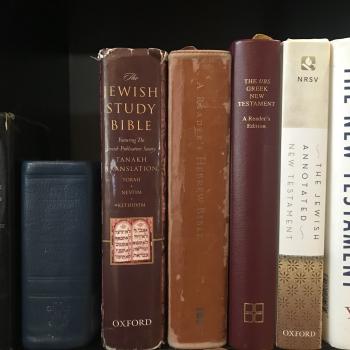
“You either believe the scriptures or you don’t.” I have, on occasion, been accused of wresting or disbelieving scripture. More often than not, this accusation has come from well-meaning people of my own faith who don’t understand how interpretation of scripture works. Often, they don’t even understand that interpretation exists.
It is impossible to read scripture without making an implicit claim as to what a passage means, which is “interpretation.” So everyone is interpreting, all the time, consciously or unconsciously.
There are different kinds of interpretation, and like tools, what kind of interpretation we use depends on what we want to do. Scholars are typically interested in the historical or “original” meaning, what scripture meant at the time, and I tend to write my posts in that vein.
About that, Elder Oaks wrote that
a scripture is not limited to what it meant when it was written but may also include what that scripture means to a reader today. Even more, scripture reading may also lead to current revelation on whatever else the Lord wishes to communicate to the reader at that time. We do not overstate the point when we say that the scriptures can be a Urim and Thummim to assist each of us to receive personal revelation.
E. Oaks may be responding to an extreme academic focus on “original” meaning of scripture (more to say about that, but no room here), but as you might guess from some of my posts, I get concerned that Latter-day Saints have become unbalanced in the other direction. We focus so much on personal application that we make no effort to understand context.
Even if our goal is devotional, applicational, or spiritual, I think contextual/original meaning should play a conscious presence in our reading of scripture.
The first thing to keep in mind when we read [scripture] is the hardest: Don’t go straight to the question “what does this mean to me?” We are constantly told that [scripture] is to be applied to our lives, and so we read it looking for ways to make it so…. I am all for applying [scripture]. Don’t get me wrong. But a better understanding of [scripture] will lead us in another direction. The first question we should ask about what we are reading is not “How does this apply to me?” Rather, it is “What is this passage saying in the context of the book I am reading, and how would it have been heard in the ancient world?”- Peter Enns [ I have replaced “Bible” with “scripture”]
Here’s a thought experiment.
Let’s stipulate that what we want in this case is to understand scripture the way a hypothetical ancient audience would have understood it, say, people passing Jeremiah at the gate; understand it the way an author intended his audience to understand it. Further, let’s imagine two people of the same religion, and for sake of argument, say we can quantify their faith and faithfulness as equivalent in every way.
Is it reasonable to suppose that a casual interpretation made in translation, without any historical, cultural, or literary context, can accurately recover the kind of understanding we’re looking for? (I would call this a “face-value” reading.)
Is it not more likely that a reading made of the “original” languages, by someone trained in historical, cultural, and literary context can get much closer to what scripture actually meant at the time? An interpretation made in very conscious awareness of differences in modern and ancient worldview, thought, and biases, and careful not to import ours into theirs? (This is a “literal” reading, which means “reading according to the author’s intention”; recognizing and reading poetry as poetry, history as history, fiction as fiction.)
Who, then, between these two, is actually understanding and believing scripture?
I believe scripture, but I believe my understanding and interpretation of scripture. If I reject YOUR understanding of scripture, I’m not rejecting scripture, but YOUR claim of what it means.
President J. Reuben Clark apparently had a similar conversation with Elder Joseph Fielding Smith, whom he addressed in a letter.
You seem to think I reject the scriptures, or some of them. I do not intend to do so, but obviously I am no more bound by your interpretation of them than you are by mine….Now, as to what the earlier brethren have said–where they have declared themselves as speaking under inspiration and by the authority of the Lord, I bow to what they say. But where they express views based on their own understanding and interpretation, then none of us are foreclosed from exercising our own reasoning powers, inadequate though they may be; but the earlier views do not foreclose us from thinking. This is particularly true, where we come to interpreting their interpretations.
So if you think your human interpretation is correct, you must make an argument for it.
In my experience, most LDS have not seen this kind of quasi-professional interpretive argumentation before, and are even less accustomed to making or evaluating such arguments. It’s not modeled in our magazines or manuals, and even good work out of BYU rarely gets into evaluating interpretations this way; it doesn’t sell to the LDS market. Consequently, the process can strike them as novel or foreign (or “mental gymnastics”), and we tend to see non-traditional things as “less faithful.”
If the process of interpretation AND the conclusion strike you as non-traditional AND it’s an academic doing this (albeit a Mormon PhD with “equivalent faith and faithfulness,” remember), well, throw in some general distrust of academics and assertions of prideful motives…
All this to say, I understand why my perception of myself as a faithful LDS scholar trying to use my talents and expertise to build Zion is sometimes at odds with fellow Saints who perceive me as dangerously unfaithful.
As always, you can help me pay my tuition here. You can also get updates by email whenever a post goes up (subscription box on the right). You can also follow Benjamin the Scribe on Facebook.












